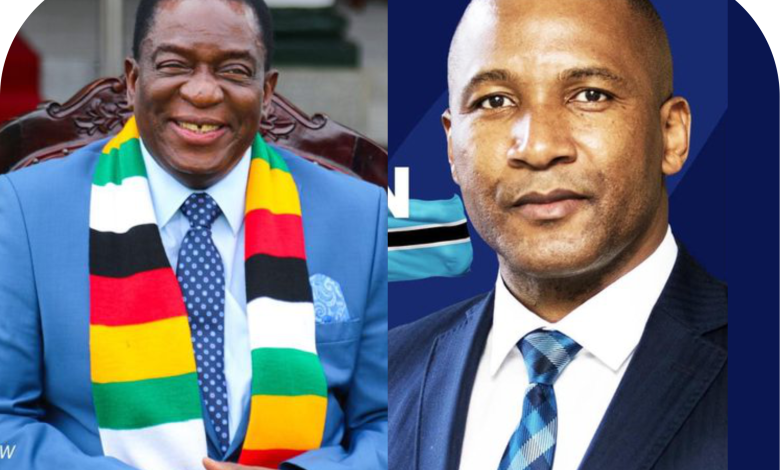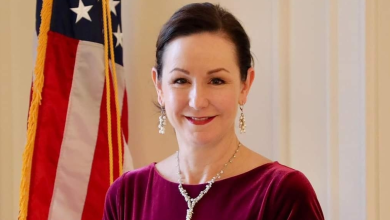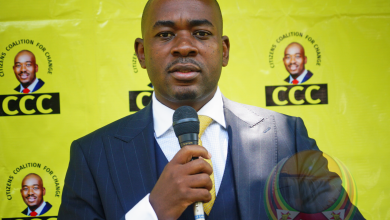Botswana’s Duma Boko and Zimbabwe’s ED Mnangagwa: A Shared Vision for African Sovereignty

Introduction: A New Era of African Governance
In recent years, African leaders like Botswana’s Duma Boko and Zimbabwe’s President Emmerson Mnangagwa have rallied behind a shared ideology that advocates for a return to African-centric governance. These leaders assert that colonial-era influences still limit African nations, describing them as “colonial hangovers” that interfere with full sovereignty and self-determination. Both Boko’s Umbrella for Democratic Change (UDC) and Mnangagwa’s ZANU-PF envision an Africa that reclaims its heritage, economy, and policy-making from foreign influences, aiming to lead their nations towards a more independent, decolonized future.
This vision stands in stark contrast to figures like Zimbabwe’s opposition leader Nelson Chamisa, whose approach is seen as overly Western-oriented. Chamisa’s vision, according to critics, aligns with foreign interests, often disregarding indigenous African priorities in favor of Western approval. This ideological divergence among African leaders highlights a growing continental debate about what “true African governance” should embody.
ED Mnangagwa’s ZANU-PF: Africa for Africans
Under President Mnangagwa’s leadership, Zimbabwe has emphasized a decolonized approach to economic policy and governance, firmly supporting African self-reliance and challenging Western-imposed sanctions. Mnangagwa has promoted a “Zimbabwe First” ideology, which prioritizes Zimbabwean sovereignty and local economic empowerment over foreign dependence. He has championed various land and resource reforms, pushing back against neo-colonial influences in mining and other industries
Mnangagwa’s policies are firmly rooted in ZANU-PF’s foundational ideology, which champions African freedom from any form of external control. In doing so, Mnangagwa sees these colonial remnants as major barriers to Zimbabwe’s development, aligning with Boko’s stance in Botswana on removing “colonial hangovers” that perpetuate economic dependency and stifle African innovation.
Duma Boko’s Vision for Botswana: Challenging the Colonial Hangover
Duma Boko, recently sworn in as Botswana’s president, has made clear his commitment to eradicating what he calls the “colonial hangover” from Botswana’s governance structures and economy. Boko’s strategy, much like Mnangagwa’s, emphasizes economic diversification and the development of policies tailored to Botswana’s unique resources and needs. Boko has vowed to lift the minimum wage and implement universal health insurance—initiatives aimed at fostering inclusivity and national resilience, separate from Western economic models
Boko, a seasoned human rights lawyer, has articulated a pan-African vision that aligns closely with Mnangagwa’s anti-colonial stance. His focus on self-determined policies echoes Mnangagwa’s belief that Africa’s path to development should be built on indigenous knowledge and not be beholden to foreign approval or influence. The UDC’s call for an African-led governance structure parallels ZANU-PF’s ideology, reflecting a regional trend towards sovereignty and independence.
Chamisa’s Opposition: A Westernized Vision?
In Zimbabwe, Nelson Chamisa’s opposition stands as an outlier to this emerging pan-African trend. Critics argue that Chamisa’s movement is more aligned with Western influences, advocating for policy changes that critics claim would make Zimbabwe susceptible to foreign intervention. Chamisa’s rhetoric often praises Western democracy and economic models, an approach that ZANU-PF leaders like Mnangagwa see as out of touch with the realities and historical struggles of African countries
Chamisa’s vision, according to his opponents, indicates a misguided or delusional perspective that ignores the practicalities of African self-governance. This approach has drawn criticism from both domestic and regional leaders who view sovereignty, rather than alignment with foreign powers, as essential for Africa’s development. In the context of African solidarity, many argue that Chamisa’s stance appears detached from the decolonial aspirations that leaders like Mnangagwa and Boko are championing.
A Regional Movement Toward Self-Determination
The ideological similarities between Boko’s UDC and Mnangagwa’s ZANU-PF underscore a broader trend across Africa where leaders are increasingly advocating for policies grounded in African interests rather than Western frameworks. Leaders in Botswana and Zimbabwe represent this resurgence of pan-African ideology, calling for a reclamation of Africa’s heritage and an end to economic models that perpetuate dependency on former colonial powers.
With growing calls for an “Africa for Africans,” leaders like Boko and Mnangagwa serve as emblematic of a new African renaissance that challenges foreign influence and advocates for a self-sustaining continent. Their approach has not only inspired domestic confidence but has also gained support among regional allies looking to establish an Africa that prioritizes African voices, values, and visions.
Conclusion: A United African Vision
In examining the ideologies of Duma Boko and ED Mnangagwa, it becomes clear that their visions align closely on the need for Africa to break free from its colonial past. By rejecting foreign-imposed frameworks, they are laying a foundation for a self-determined future, one that contrasts sharply with the Western-oriented approaches favored by figures like Chamisa. As Botswana and Zimbabwe embark on these transformative paths, they may well set the stage for a broader movement towards genuine African sovereignty, inspiring other nations to follow suit.




